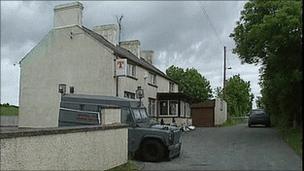Ombudsman Loughinisland report: police failed families
- Published

NI police failed the families of six people murdered by loyalists in 1994 by not investigating the killings properly, the police ombudsman said.
In a new report, Al Hutchinson said there was no evidence of collusion between police and the UVF gang in two specific areas of his investigation.
But there was insufficient evidence of collusion surrounding the getaway car used in the Loughinisland murders.
He said the police investigation lacked diligence, focus and leadership.
Mr Hutchinson would not say whether informers had a role in the killings.
In his report, he said there was insufficient evidence of collusion with regards to police inquiries into the getaway car; no evidence of collusion in the destruction of the car and no evidence that police could have prevented the attack at the Heights Bar.
Police have apologised for a lack of communication and inconsistency over the killings.
On 18 June 1994, the rural pub was busy with people watching the Republic of Ireland play Italy in a World Cup match.
Just after 2200 BST, two UVF members walked in and fired indiscriminately.
The six men who died were Adrian Rogan 34, Malcolm Jenkinson, 53, Barney Greene, 87, Daniel McCreanor 59, Patrick O'Hare, 35, and Eamon Byrne, 39.
All were Catholic civilians. Mr Greene was one of the oldest people to be killed in the Northern Ireland Troubles.
Sixteen people have been arrested in connection with the attack but no-one has ever been convicted.
The relatives of the victims believe the police's investigation was impeded by its desire to protect its informers within the ranks of the UVF.
'Suspicious'
They made a formal complaint to the office of the Police Ombudsman in 2006.
Mr Hutchinson, who met the families prior to the publication of his report on Friday, said that is still their contention.
"I acknowledge their belief and while there is reason to be suspicious over certain police actions I consider there is insufficient evidence to establish that collusion took place."
Mr Hutchinson listed a number of failings in the investigation:
- records are missing
- a getaway car recovered in the aftermath of the attack was destroyed by police ten months later
- police failed to investigate the link between the Loughinisland shootings and other attacks
- Failures in the management of the murder incident room and in the management of the computer system used by the investigation may have resulted in the loss of evidential opportunities
"These cumulatively indicate a lack of cohesive and focused effort over the years," Mr Hutchinson said.
"The families have been failed by the intermittent focus and attention."
Relatives had alleged that police inquiries related to the getaway car were not pursued rigorously due to the involvement of a police informant in its chain of ownership.
"Whilst I will neither confirm nor deny whether or not any individual was a police informant, I am satisfied that no suspects were afforded protection as informants," Mr Hutchinson added.
The ombudsman also said that the disposal of the vehicle should not have taken place without the permission of the detective leading the investigation.
It cannot be determined whether this resulted in the loss of future evidential opportunities, he added.
Investigators from the ombudsman's office also examined an allegation that a serving police officer had been involved in the storage of vehicles used in the attack and that he had passed on details of a witness in the investigation to a member of the public.
"Both matters were investigated and have not resulted in any criminal or disciplinary proceedings against the officer," Mr Hutchinson said.
Seven weeks after the attack, a holdall containing the clothing, weapons and ammunition believed to have been used in the attack, along with another rifle, were found.
It was subsequently established that the weapon used at Loughinisland was linked to two other terrorist attacks and that another gun in the holdall was linked to three other attacks.
These issues had not been investigated "at an appropriate stage and in a timely manner", Mr Hutchinson said.
'Sadness and frustration'
He added that police had demonstrated significant efforts to arrest suspects but had failed to communicate effectively with the victims and survivors of the attack.
He has made three recommendations which he said were designed to reinvigorate the police investigation.
A PSNI spokesperson said it accepted the recommendations made by the ombudsman and was fully committed to apprehending those responsible for the attack.
"There is a great sadness and frustration for all of us in policing that those responsible for this horrific crime have never been brought to justice," he said.
"An ongoing Serious Crime Review will seek to re-establish direct lines of communication with the families."
The families of those who died are due to hold a press conference later on Friday morning.
- Published24 June 2011
- Published9 June 2016
- Published24 June 2011